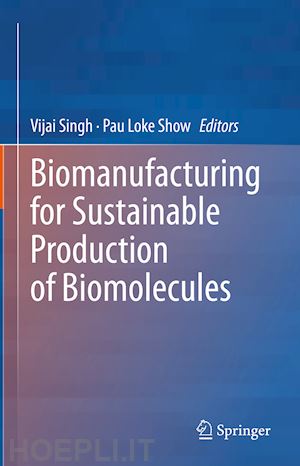
Questo prodotto usufruisce delle SPEDIZIONI GRATIS
selezionando l'opzione Corriere Veloce in fase di ordine.
Pagabile anche con Carta della cultura giovani e del merito, 18App Bonus Cultura e Carta del Docente
This book elucidates the sustainable production of commercially important biomolecules in medicines, food, and beverage processing, through biological systems, including microorganisms, animal cells, plant cells, tissues, enzymes, and in vitro. It discusses promising technologies for the manipulation of cells including, genetic engineering, synthetic biology, genome editing, and metabolic engineering. The initial chapters of the book introduce topics on biomanufacturing, circular economy, strain design and improvement, upstream and downstream processing. The subsequent chapters cover artificial intelligence-assisted production, designer cell factories, biosensors for monitoring biomolecules, different cells factories, biosynthetic pathways, and genome editing approaches for scale-up biomanufacturing. Lastly, the book discusses the opportunities and challenges of implementing biological systems for the production of biomolecules.
This book is a valuable source for students, researchers, scientists, clinicians, stakeholders, policymakers, and practitioners to understand biomanufacturing for the sustainable production of biomolecules.
Dr. Vijai Singh is an Associate Professor and Dean (Research and Innovation) in the Department of Biosciences, School of Science at Indrashil University, Rajpur, Mehsana, Gujarat, India. He was an Assistant Professor in the Department of Biological Sciences and Biotechnology at Institute of Advanced Research, Gandhinagar, India and also an Assistant Professor in the Department of Biotechnology at the Invertis University, Bareilly, India. Prior to that, he was a Postdoctoral Fellow in the Synthetic Biology Group at the Institute of Systems and Synthetic Biology, Paris, France and School of Energy & Chemical Engineering at the Ulsan National Institute of Science and Technology, Ulsan, South Korea. He received his Ph.D. in Biotechnology (2009) from the National Bureau of Fish Genetic Resources, Uttar Pradesh Technical University, Lucknow, India. During his PhD, he has cloned, expressed and characterized hemolysin from Aeromonas hydrophila in Escherichia coli. He has extensive experience in MAGE, small regulatory RNAs, pathway designing, CRISPR-Cas systems, and microfluidics. His research interests are focused on building novel biosynthetic pathways for production of medically and industrially important biomolecules. Additionally, his laboratory is working on CRISPR-Cas9 tools for genome editing. He has more than 10 years of research and teaching experience in synthetic biology, metabolic engineering, microbiology, and industrial microbiology. He has published more than 80 research articles, 51 book chapters, 16 books and 4 patents. He serves as an associate editor, editorial board member and reviewer of a number of peer-reviewed journals. He is also a member of the Board of Study and Academic Council of Indrashil University and is the Member Secretary of Institutional Biosafety Committee (IBSC) in the same University.
Prof. Ir. Ts. Dr. Pau-Loke Show is founder and the former President of International BioprocessingSociety in Malaysia. He also the director of Sustainable Food Processing Research Centre and Co-director of Future Food Malaysia, Beacon of Excellence, in the University of Nottingham Malaysia. He is a Full Professor at the Department of Chemical and Environmental Engineering, Faculty of Science and Engineering, University of Nottingham Malaysia. He has successful obtained his PhD in two years’ time after obtaining his bachelor’s degree from Universiti Putra Malaysia. In the year of 2022, he is elected as a Fellow of IChemE (FIChemE). He is currently an Asian Professional Engineer (PEng) registered with the Board of Engineers Malaysia, Fellow of the Engineering Council UK (CEng), Cooperate Member of The Institution of Engineers, and Professional Technologies (PTech) registered with the Malaysia Board of Technologists. Prof Ir. Ts. Dr. Show obtained the Post Graduate Certificate of Higher Education (PGCHE) in 2014 and is now a Fellow of the Higher Education Academy (FHEA) UK. Since he started his career in 2012, he has received numerous prestigious academic awards, including the Highly Cited Researcher 2022, Tan Sri Emeritus Professor Augustine S H Ong International Special Award on Innovations and Inventions in Palm Oil 2021, APEC Science Prize for Innovation, Research and Education (“ASPIRE”) Malaysia Award 2020, Malaysia Young Scientist 2019 Award, ASEAN-India Research and Training Fellowship 2019, The DaSilva Award 2018, JSPS Fellowship 2018, Top 100 Asian Scientists 2017, Asia’s Rising Scientists Award 2017 and Winner of Young Researcher in IChemE Award 2016. He has graduated more than 20 PhD and MSc students and is leading a team of 20 members consisting of postdoctoral, PhD and MSc research students. Up to 2022, he has published more than 850 journal papers in less than 10 years of his career. His publications have been cited over 18,000 times over the past 5 years. His current h-index is 70, placing him among the top leaders of his chosen field (Microalgae Technology). He is also the Primary Project leaders for more than 35 projects from International, National, and Industry Projects, with total amount more than MYR5.0 million. He is now serving as an Editor-in-chief in Current Nutrition & Food Science, Editor in Scientific Report, Biocatalysis and Agricultural Biotechnology, Associate Editor at Bioengineered; Current Biochemical Engineering; The Open Microalgae Biotechnology, and Editorial board member in Bioresource Technology and, Biochemical Engineering Journal. He also managing lead guest editor for many well reputation journals, examples, Journal of Hazardous Materials, Elsevier; Biofuel Research Journal, Elsevier; Environmental Pollution, Elsevier; Chemosphere, Elsevier; Clean Technologies and Environmental Policy, Springer; Bioengineered, Taylor & Francis; Processes, MDPI; Energies, MDPI; Biocatalysis and Agricultural Biotechnology, Elsevier; Frontiers in Energy Research, Frontiers; BMC Energy, Springer Nature; Materials Science for











Il sito utilizza cookie ed altri strumenti di tracciamento che raccolgono informazioni dal dispositivo dell’utente. Oltre ai cookie tecnici ed analitici aggregati, strettamente necessari per il funzionamento di questo sito web, previo consenso dell’utente possono essere installati cookie di profilazione e marketing e cookie dei social media. Cliccando su “Accetto tutti i cookie” saranno attivate tutte le categorie di cookie. Per accettare solo deterninate categorie di cookie, cliccare invece su “Impostazioni cookie”. Chiudendo il banner o continuando a navigare saranno installati solo cookie tecnici. Per maggiori dettagli, consultare la Cookie Policy.